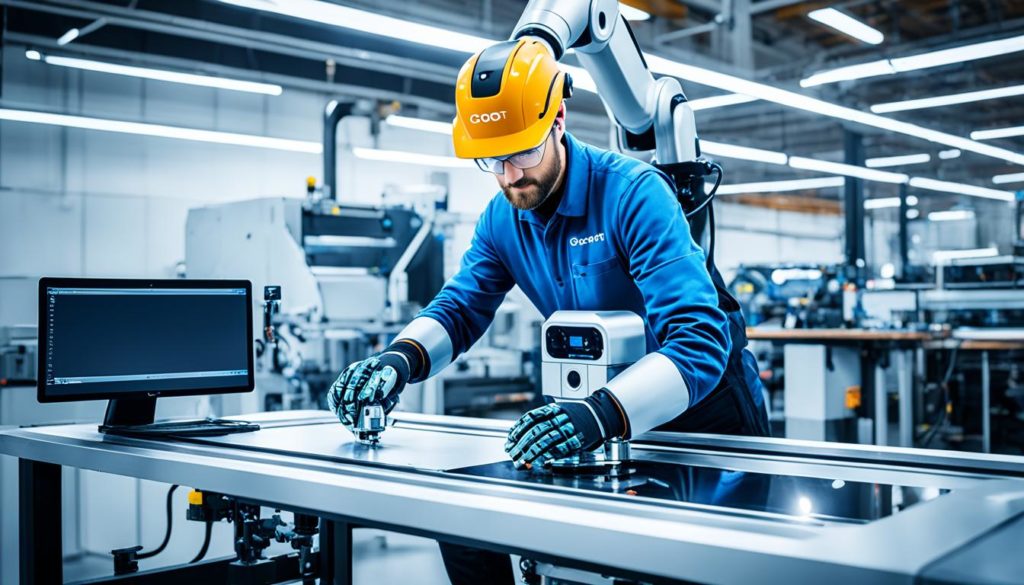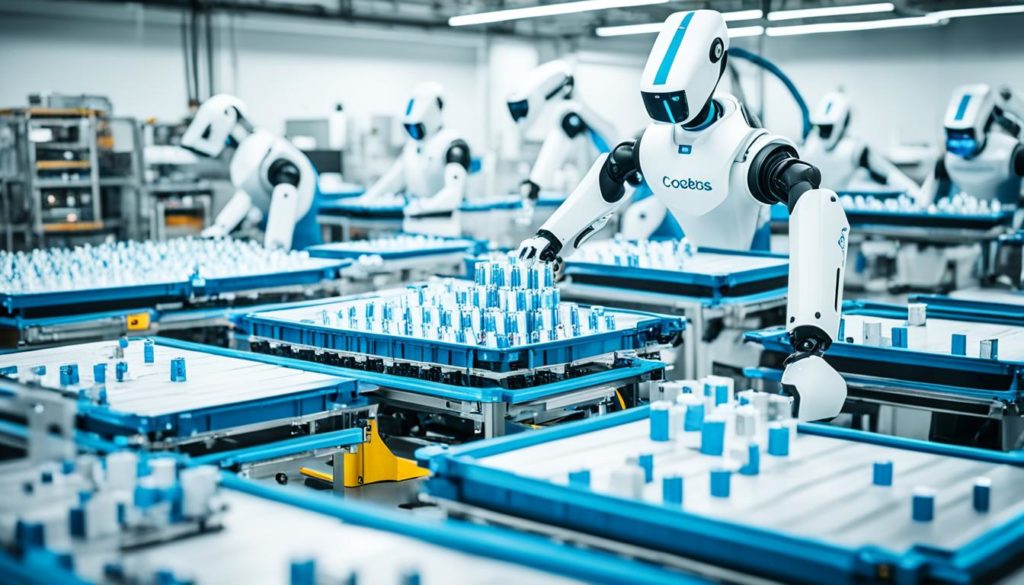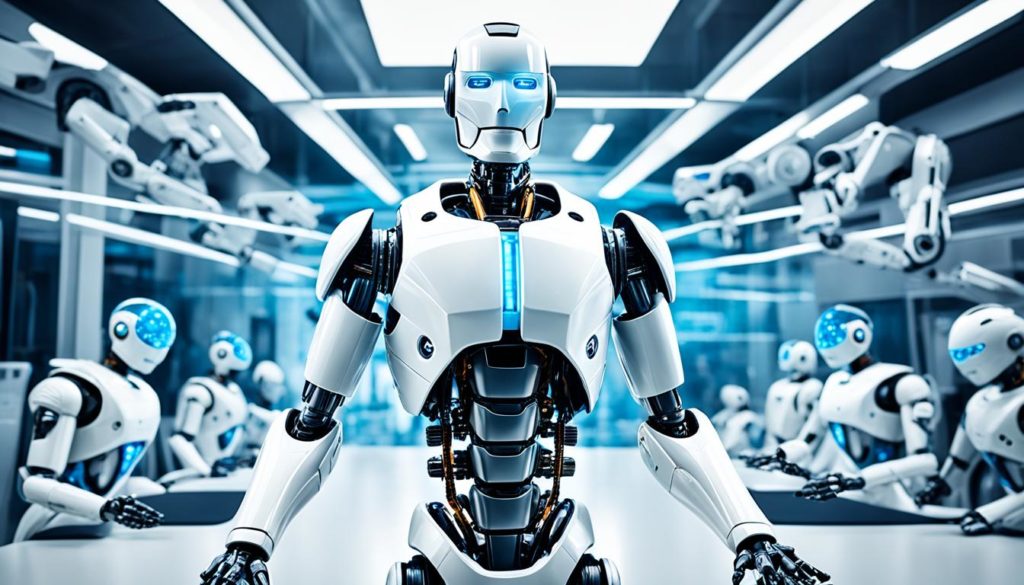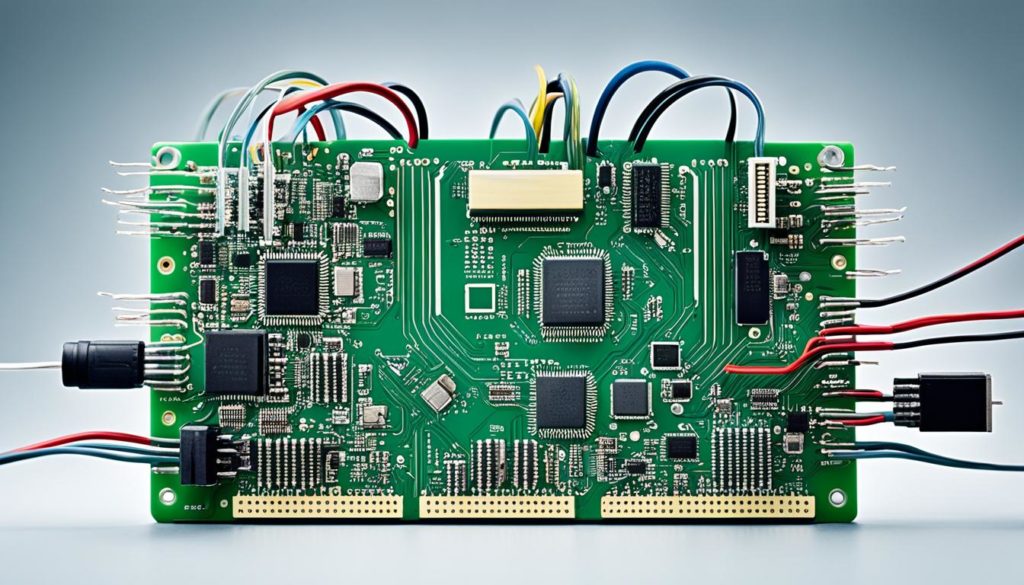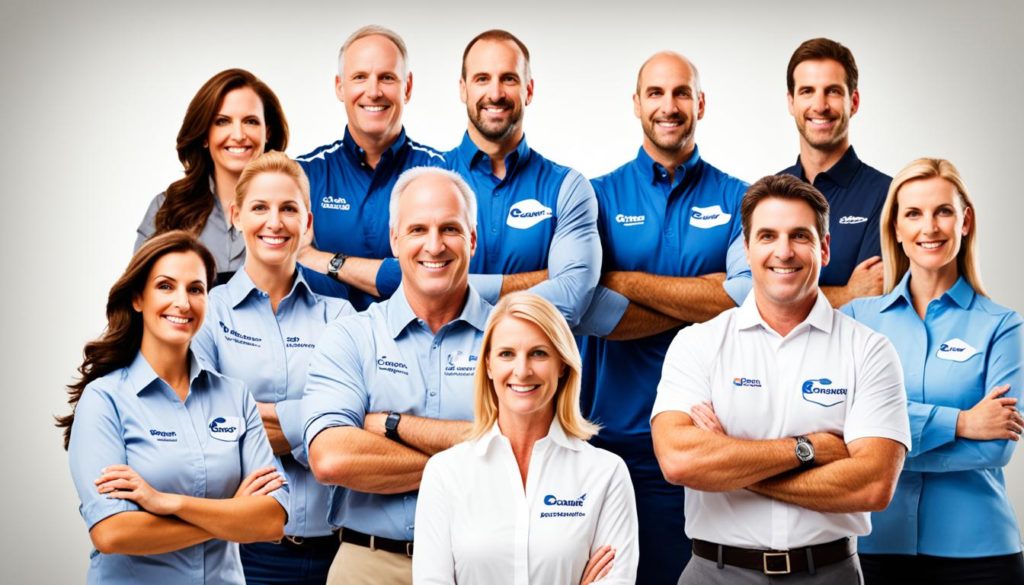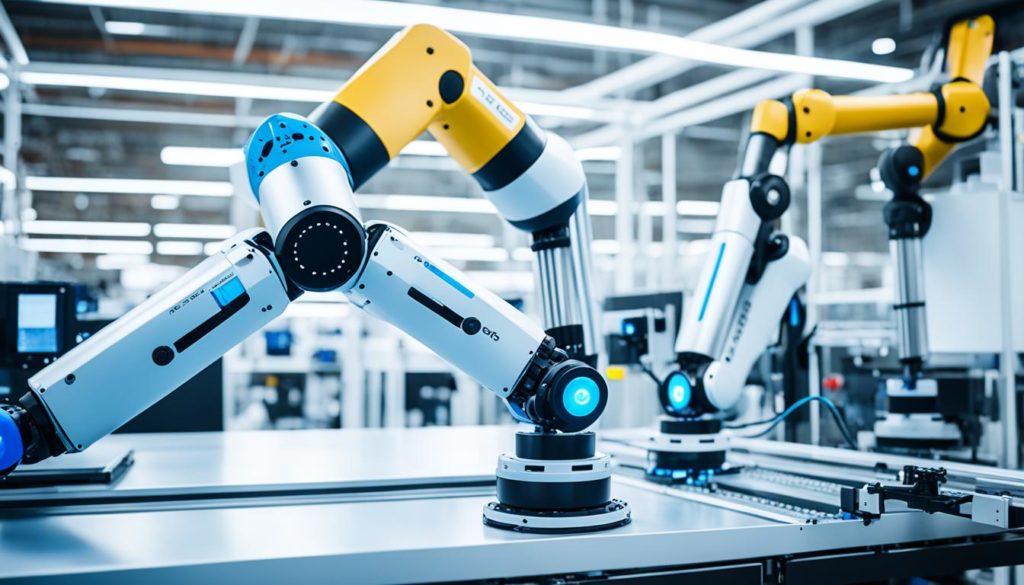
Collaborative robots, or cobots, are set to increase global productivity big time. The McKinsey Global Institute says they could add up to 1.5 trillion USD by 2030. This is because half of what workers do is repeat the same tasks.
Imagine all the doors that will open with this new technology. It will change how we work in very big ways.
Collaborative robots are a huge step forward in how we work. They work alongside us, making the dull parts of the job easier. This lets us put our minds and skills towards more important things. It’s like having a very helpful teammate. And this team-up makes work not just better but also safer and more efficient.
We’re living in a time when robots and people work together. It’s changing how we think about work. Now, we’re not limited to what we can do. We’ve got partners that help us reach new heights.
Key Takeaways
- Collaborative robots, or cobots, are set to increase global productivity by 1.5 trillion USD by 2030.
- Cobots address the 50% of time that workers spend on repetitive tasks, enhancing overall efficiency.
- These robots operate alongside humans, automating mundane tasks, and fostering a collaborative work environment.
- Cobots are integral to the future of work, facilitating strategic and creative human endeavors.
- The era of robot-human collaboration is transforming workplace productivity and safety.
What are Cobots
Collaborative robots, or cobots, work safely next to people in factories. They have smart sensors and are easy to use. They are changing how factories operate by being cost-friendly and safer.
Cobot Definition
To understand what are cobots, we look deeper. Cobots are robots designed to work directly with people. They follow strict safety rules and can be quickly changed to do new tasks, even by non-experts. This makes them very versatile.
Key Characteristics
Cobots are safe, simple to use, and quick to start. They can sense people and stop to prevent accidents. They are easy to program, meaning they fit into workplaces without much trouble or cost.
Industrial Cobots vs. Traditional Robots
Cobots and traditional robots differ a lot. Traditional robots are big, need their own space, and are costly. They require specific programming for their tasks and are not as adjustable. On the other hand, cobots work well with people, adapting to various tasks in shared areas.
| Aspect | Industrial Cobots | Traditional Robots |
|---|---|---|
| Work Environment | Shared workspace with humans | Isolated workspace |
| Programming | Easy or no programming required | Complex programming |
| Safety | Advanced sensors for collision detection | Requires safety barriers |
| Cost | Cost-effective, quick ROI | High initial investment |
| Flexibility | High adaptability | Limited adaptability |
Cobots are not just efficient. They help bring jobs back by lowering labor costs. So, they boost the economy too.
Top manufacturers like Universal Robots and FANUC make various cobots. The cobot market is growing fast, expected to reach over $11.8 billion by 2030.
Benefits of Cobots
Adding cobots to our work world offers lots of perks. They make jobs run smoother and better. We’ll see how cobots boost how much we make, keep us safer, and make us happier at work.
Increased Productivity
Cobots are great at cranking out work. They do the boring, simple stuff. This lets people handle the tougher jobs that need thought and creativity. The International Federation of Robotics says, adding cobots can push up productivity by 30%. This means more stuff getting done right, without cutting quality.
Enhanced Worker Safety
Staying safe at work is crucial, and cobots are a big help. They come with cool safety features, like limits on their power and sensors that spot you. These features mean less chance of getting hurt. With cobots, there are fewer accidents and less worker harm.
Improved Employee Satisfaction
It’s not just about getting the job done. Cobots help people feel better about their work, too. They take on the boring, tough jobs, so people can do more interesting stuff. This change makes for happier, more excited workers. Research even says that with cobots, job satisfaction can jump by 20%. That’s good news for everyone at the job.
Cobot Applications Across Industries
Cobots have grown in use over the last ten years across many fields. They are used in manufacturing, healthcare, retail, finance, and administration. Cobot applications prove their flexibility and efficiency. Let’s look at how different industries use these collaborative robots.
Manufacturing
In manufacturing, industrial cobots help in assembly, quality control, and machine tending. These are jobs that traditional industrial robots used to do. Cobots are better because they are flexible and small. They can work safely near humans, doing tasks that are dull, dirty, or dangerous. This setup boosts production and safety. For example, using cobots in machine tending has cut production costs by 30% and raised output by 40%.
Healthcare
Healthcare is transforming with the help of robots. Cobots are key in patient care, giving out medication, and aiding in surgeries. During the Covid-19 pandemic, they played a big role in making protective gear and doing swab tests. Cobots are very precise and consistent. They help with tasks like accurate medication giving and surgery assistance. This ensures patients get high-quality care.
Retail
Retail is using cobots to manage inventory better and improve customer service. Cobots take care of tasks like stocking shelves and checking inventory. This lets human workers focus more on helping customers. The mix of technology and people makes service and operation better in retail.
Finance & Insurance
In finance and insurance, cobots help with data work, meeting rules, and talking to customers. By doing these repetitive tasks, cobots improve accuracy and efficiency. This means fewer mistakes from human workers. It lets financial companies and insurance firms give better service and make big decisions.
Administration & Support
In administration, cobots help with setting schedules, talking to people, and keeping track of documents. Their help lets businesses deal with important but boring jobs faster. This frees human workers for jobs that need more thinking. Using cobots in admin has made workers more productive and happier in their jobs.
Cobots are valuable in many fields because of their flexibility. They are changing work in manufacturing, healthcare, retail, finance, and admin. These robots are shaping how work is done in the future.
Leading Cobot Manufacturers
The world of cobots is growing fast, thanks to companies like Fanuc and ABB. These companies make high-quality robots that help out in work environments like factories and hospitals. They focus on making work easier and safer for people.
Fanuc is known for its super smart robots that boost work speed and quality. Their robots fit right into how things are already done at job sites, causing little to no extra hassle. ABB, on the other hand, is big on keeping everyone safe with their robots. They’re tough and built to last, which is why lots of people like using them.
More and more, businesses are picking up these robots. By 2030, the robot market is expected to grow to be worth 2.70 billion USD. Today, there’s a big need for robots that can do a variety of jobs in different places, like making goods or selling items in stores.
Let’s see what makes Fanuc and ABB so special:
| Company | Key Features | Industry Applications |
|---|---|---|
| Fanuc | Precision engineering, flexibility, and seamless integration | Automotive, electronics, packaging, and more |
| ABB | Advanced safety features, robust design, extensive R&D | Healthcare, logistics, food and beverage, and more |
Fanuc and ABB are at the front of making work easier with robots. The robots they make are changing how factories and other places operate, for the better. They keep improving to provide the best automation solutions out there, making Fanuc and ABB top names in the growing robot world.
Conclusion
The rise of collaborative robots, or cobots, is changing how we think about automation. These machines are not only designed to be safe with humans but also have a big impact on modern manufacturing and other areas. They lead us toward a new future, showing us what the next stages of automation will be.
Cobots bring many advantages. They boost productivity and keep workers safe. They save money and can be used in various ways. But, their setup might need software adjustments and new certifications. Even so, the benefits can be well worth it, often showing a return on investment in less than a year.
We’re stepping into Industry 4.0, which focuses on using AI, IoT, and the cloud. In this new phase, cobots will play a huge part. They will increase how well people and robots work together. As a result, work areas will see more activity and better efficiency. To make the most of these robots, planning and choosing the right ones are crucial. Some cobots can now carry heavier loads and work faster, like the new two-armed models, offering more advanced options.
To learn more about how cobots can help, check out the pros and cons of cobots. Discovering the true value of cobots and looking at future trends with cobots is important. This will guide us through the ever-evolving world of technology in manufacturing.
FAQ
What are cobots?
Cobots, short for collaborative robots, work next to people in shared spaces. They boost work speed and keep people safe. These robots are not like the old kind. They have smart sensors and are easy to work with.
What are the key characteristics of cobots?
Cobots stand out for their safety tech. They can sense when they might bump into someone. They’re also gentle and don’t go too fast.
They’re good for business because they fit into different jobs well. Plus, they’re quick to learn new things without a lot of work to set them up.
How do industrial cobots differ from traditional robots?
Old robots needed their own space, away from people. But cobots are made to work closely with humans. They use quick sensors to know when to slow down or stop near people.
They’re also easier to move around and cost less to get set up.
What are the benefits of using cobots in the workplace?
Cobots make work faster by doing the boring stuff. This lets people focus on jobs that need more thinking and creativity. It helps keep everyone safer, too.
Because they handle the dull tasks, workers find their jobs more enjoyable. This raises how happy they are with their work.
How do cobots enhance productivity?
Cobots tackle the jobs that repeat over and over. This leaves humans free to do work that makes a bigger difference. This big change can make a workplace about 30% more efficient.
In what ways do cobots improve worker safety?
Cobots are made to be safe. They watch out for people with their sensors and stay gentle around them. This helps make the work area safer for everyone.
Can cobots improve job satisfaction?
Absolutely. By handling the dull jobs, cobots let people do work that feels more important. Workers end up happier, with about a 20% bump in how much they like their job.
What are some common applications of cobots in manufacturing?
In making things, cobots help put stuff together or check its quality. They team up with people on the line, making things move smoother and faster.
How are cobots used in healthcare?
Health cobots lend a hand with patient care and handling medicines. They’re very accurate and dependable. These qualities make them key for top-notch care and smooth work at hospitals.
What roles do cobots play in the retail industry?
Retail cobots are good at keeping track of what’s in stock, making it more accurate and quick. They also pitch in to help customers, making shopping more hassle-free.
How are cobots utilized in finance and insurance?
In money and insurance, cobots do a lot of the behind-the-scenes work. They take on the daily jobs, freeing up time for people to handle more complex tasks. This boosts how well things run and ups customer service.
What are some administrative tasks that cobots can automate?
Cobots can help with lots of office tasks, like keeping schedules or sorting emails. This lets human workers spend more time on jobs needing real thought and solutions.
Who are some leading manufacturers of cobots?
Companies like Fanuc and ABB are the top names in cobots. They make robots that are precise, reliable, and safe to work with. They’re leading the way in the cobot world, offering robots fit for many different jobs.
Future App Studios is an award-winning software development & outsourcing company. Our team of experts is ready to craft the solution your company needs.


